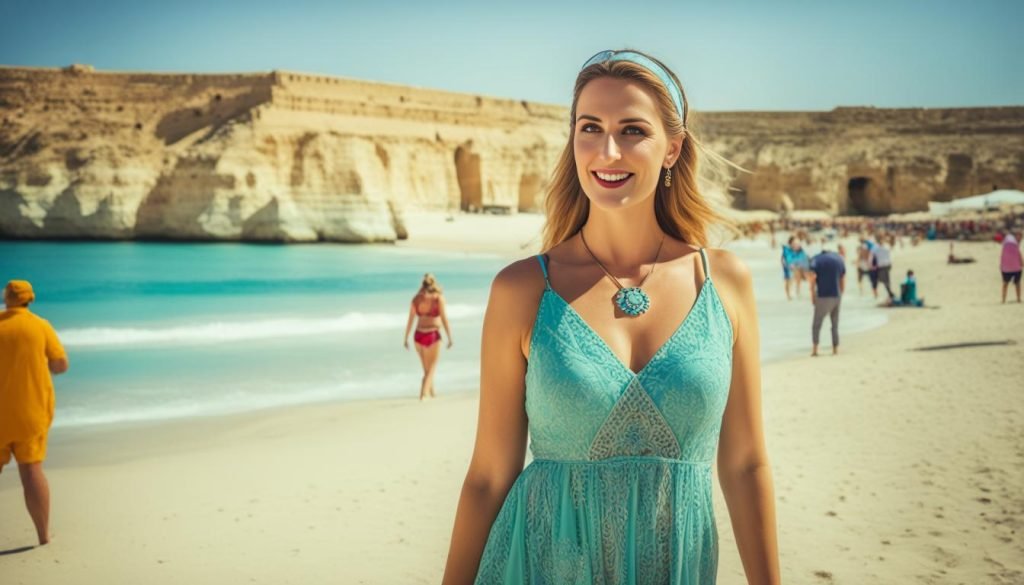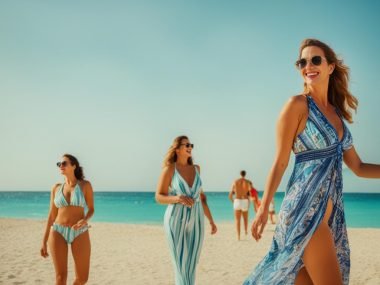As I packed for my first trip to Tunisia, I wondered about the right beachwear. Everyone was talking about what tourists should wear. Walking on Hammamet’s sunny beaches, I saw people in bikinis and others in cover-ups. This showed me that knowing the rules about bikinis in Tunisia is about more than comfort. It’s about respecting local traditions.
From what I’ve learned, there’s a balance to beach life in Tunisia. It’s about mixing respect with freedom. Adapting to local customs doesn’t mean giving up your favorite swimwear. Whether in a bikini or a full swimsuit, showing respect is essential. This respect helps embrace the country’s traditions.
Key Takeaways
- Understanding the accepted beach attire in tourist spots versus traditional areas is crucial.
- Being aware of the bikini in Tunisia rules helps align with local customs.
- Opting for a full swimsuit or a bikini with a cover-up can meet the Tunisia dress code for tourists.
- Awareness and respect for Tunisia’s Muslim heritage inform appropriate beachwear choices.
- Dressing modestly can enhance the travel experience and show respect for the local culture.
- Useful Tunisia travel tips can make for a more comfortable and culturally sensitive visit.
Understanding Tunisia’s Cultural Attire Expectations
As a keen explorer, I’ve learnt to respect Tunisia’s culture and clothing on my travels. This understanding improves your visit and keeps you in tune with local traditions. It’s key while walking through busy medinas or enjoying mint tea in quiet courtyards. Your clothing choice plays a big role.
The Importance of Dressing Conservatively
In Tunisia’s heart, a place where past and present merge, dressing conservatively is valued by the locals. This involves wearing clothes that cover more, like long sleeves and bottoms that go below the knee. Such choices mirror the clothing restrictions in Tunisia and show respect for its Islamic society, where modest dressing is important.
Regional Clothing Differences: Touristy vs Local Areas
In the lively streets, you’ll notice that what to wear in Tunisia changes depending on the area. Tourist spots like Sousse and Djerba’s beaches offer a relaxed dress code. Here, lighter, airy outfits are acceptable. However, wearing more conservative clothes outside these areas is seen as polite.
| Location | Recommended Attire for Women | Recommended Attire for Men |
|---|---|---|
| Touristy Beaches | Sundresses with cover-ups, loose-fitting trousers, t-shirts | Swim shorts, casual t-shirts, and breathable trousers |
| Local & Rural Areas | Maxi skirts, tunics covering the shoulders, trousers | Long pants, collared shirts, traditional tunics |
| Religious Sites | Long-sleeved tops, scarves for covering the head, full-length skirts | Long trousers, long-sleeved shirts, modest shoes |
Dressing right allows you to appreciate Tunisia’s diverse architecture more. This includes influences from Ottoman, Roman, and French history. By choosing your outfits wisely, you bridge cultural divides. This leads to deeper connections and shared joy. It’s about balancing comfort with politeness, to fully experience Tunisia’s unique way of life.
Tunisia Beach Attire: Navigating the Do’s and Don’ts
As I wander along Tunisia’s coasts, I often wonder, ‘Can You Wear A Bikini In Tunisia?’ It’s vital to know what to wear on Tunisia’s beaches. This ensures you respect local traditions while soaking up the sun. While Tunisia doesn’t ban bikinis outright, knowing where they’re acceptable is crucial for a worry-free vacation.
In tourist areas, wearing a bikini with something like a sarong is ideal. Always have your cover-up ready. It’s perfect for quickly covering up when moving from beach to town, keeping both local customs and your comfort in mind.
In places with stronger traditional values, I prefer less revealing swimsuits. This avoids unwanted attention and matches Tunisia’s modest dressing standards. Here’s a handy guide on what to wear to the beach in Tunisia:
| Location | Recommended Beachwear | Not Advised |
|---|---|---|
| Touristy Beach Areas | Bikinis with Cover-ups such as Sarongs or Kaftans | Excessively Revealing Swimwear |
| Local and Less Touristy Zones | Full Swimsuits or Less Revealing Two-Pieces | Bikinis without Adequate Cover-ups |
Most importantly, always prioritize modesty in Tunisia’s beach culture. Whether you’re relaxing in Hammamet or exploring quieter spots, dressing thoughtfully ensures a good time for everyone.
The Appropriate Beachwear for Women in Tunisia
Planning a trip to Tunisia brings up a key question: Can You Wear A Bikini In Tunisia? The reply is complex. It varies based on the location. In places welcoming tourists, wearing bikinis is generally fine. But remember, having something to cover up with is crucial. It fits the Tunisia dress code for tourists. Thus, you’re ready for any place, from the beach to a cafe.
Understanding local dress code rules is vital for my Tunisia travel tips. Covering up when leaving the beach shows respect. It also feels better away from the sea. A light kaftan has become my perfect pick. It offers both modesty and style.
To aid your packing, here’s a table with beachwear advice:
| Area Type | Recommended Attire | Additional Tips |
|---|---|---|
| Tourist Resorts (e.g., Hammamet) | Bikini with Cover-Up | Wrap a sarong or throw on a kaftan when not sunbathing. |
| Local Beaches | Full Swimsuit | Opt for a one-piece or tankini to respect local customs. |
| Cultural/Religious Sites Nearby | Modest Swimwear and Clothing | Ensure shoulders and knees are covered, especially when leaving the beach. |
The aim is to find a balance between comfort, cultural respect, and your style. Whether lounging on Djerba’s beaches or exploring Sousse’s old medina, being aware of local culture makes the visit better and respectful. Tunisia, with its stunning views and rich history, welcomes you warmly.

Navigating Swimwear Etiquette in Tunisia’s Coastal Resorts
Exploring Tunisia’s coast means understanding local customs. The right beachwear blends style and respect for rules. Here’s my guide on choosing suitable attire.
Choosing the Right Swimwear for Tourist Spots
In tourist areas, bikinis are common. But, it’s smart to have a cover-up for moving between places. While colorful bikinis are everywhere, covering up off the beach shows respect.
Dealing with Unwanted Attention: Practical Tips
In cosmopolitan resorts, less revealing clothes reduce unwanted attention. Balancing personal choice with cultural respect is key. Full swimsuits suit less touristy areas well, showing adaptability and respect.
| Location | Recommended Swimwear | Additional Tips |
|---|---|---|
| Tourist Beaches | Bikinis with cover-ups | Cover up when leaving the beach |
| Local/Traditional Areas | Full swimsuits | Opt for more conservative designs |
| Cape Bon and similar locales | One-piece swimwear | Maintain modesty near cultural sites |
Understanding bikini rules enriches visits to Tunisia’s beaches. It’s a balance of tradition and freedom. This blend makes Tunisia’s coast timeless and charming.
Dressing for Religious Sites: When to Cover Up
Roaming the lively streets of Tunisia, we quickly notice the Tunisian culture and clothing. The beauty of religious sites catches our eye. But, it’s crucial to respect the Tunisian dress code for tourists. Covering up shows reverence to Tunisia’s traditions and faiths.
When deciding what to wear in Tunisia, especially at religious places, women should wear clothes that cover their shoulders and legs. A headscarf is also necessary. It shows respect and connects us to the culture. The rule applies not just in mosques but also around them. Headscarves should be simple or have non-figurative patterns. This matches the local spiritual style.
| Clothing Item | Consideration for Religious Sites | Appropriate for Tunisian Culture |
|---|---|---|
| Headscarf | Plain or geometric designs, covers hair and neck | Yes |
| Long-Sleeved Shirts/Blouses | Fully cover arms and shoulders | Yes |
| Long Skirts/Trousers | Completely cover legs | Yes |
| Footwear | Remove before entering prayer areas | Yes |
Adhering to these dress code rules while visiting Tunisia’s holy sites helps build bridges of respect. It is a key part of travelling. It lets us dive deeply into Tunisia’s rich history and spirituality.
Footwear Recommendations for Tunisia’s Varied Terrain
When planning my journey to Tunisia, I consider the diverse landscapes that await – from ancient Roman Ruins to sweeping deserts and bustling city streets. Having the right footwear is essential in enhancing my experience; it bridges the gap between comfort and cultural etiquette. Below, I’ll explore the most suitable choices for both urban exploration and leisurely beach days, ensuring that my Tunisia travel tips are as practical as they are respectful.
Best Choices for Urban Exploration
Total immersion in Tunisia’s urban charm requires traversing cobbled alleyways and enduring the complexities of city terrain. Here, sturdy walking boots are my companions – tough enough to negotiate uneven paths yet stylish in a way that honours the local sensibilities. High heels, tempting as they might be for nights out, are left at home; the cobblestones are unforgiving and high heels clash with Tunisia’s conservative values. Instead, I opt for comfortable flats, perfect for evening strolls through Medina as they blend practicality with a touch of elegance.
Beach and Casual Footwear
Should I decide to don a bikini in Tunisia’s more liberal coastal areas, my footwear also leans towards the relaxed – sandals are the ideal choice. They offer ease of wear for beach lounging and transitioning to casual cafes alongside the promenade. The lightweight nature of sandals also means I’ll have more space in my luggage for other essentials, adhering to the practical Tunisia travel tips.
| Activity | Footwear Type | Why It’s Suitable |
|---|---|---|
| Urban Exploration | Sturdy Walking Boots | Handles uneven surfaces, respects cultural norms |
| Evening Out | Comfortable Flats | Practical for cobbled streets, culturally appropriate |
| Beach Visits | Sandals | Easy to wear, complements relaxed beach attire |
Seasonal Wardrobe Guide: Summer vs Winter in Tunisia
When visiting Tunisia, adapting to the Mediterranean climate is key. This also means respecting the local dress code. I’ve learned that the right clothes can make you comfortable and help you fit in culturally.
In summer, the heat means you should wear light, airy fabrics like cotton or linen. Choose loose clothes that cover your shoulders and knees. This shows respect while keeping you cool. Here’s a guide for summer wardrobe essentials for Tunisia:
| Garment | Material | Occasion |
|---|---|---|
| Long skirts | Cotton, Linen | Day-to-day exploring |
| Lightweight trousers | Breathable fabrics | Cultural visits, dining out |
| Maxi dresses | Cotton | Beach outings, casual strolls |
Remember, while Tunisia basks in sunlight, modesty remains a mark of respect.
In winter, it gets cooler so layering up is smart. Pack jeans, jumpers, and jackets for the cold. The weather may be mild but changes, so be ready for cold nights, especially inland.
- Jeans: They keep you warm on cooler days.
- Jumpers: Great for style and warmth.
- Jackets: Essential for chilly evenings and wind.
Knowing what to wear and following Tunisia’s dress code enriches your visit. When unsure, look at what locals wear to know what’s appropriate.
Women’s Dress Codes: Balancing Comfort and Respect
When planning my wardrobe for a trip to Tunisia, I aim for comfort while respecting local culture. Understanding the Tunisia dress code for tourists ensures my clothes are suitable. It shows respect for Tunisia’s traditions.
On my trips, long-sleeved tunics are a stylish choice. They offer the right coverage, matching Tunisia’s modest dress codes. Maxi dresses are also great. They’re comfy and respect the country’s values. For cooler evenings or less touristy spots, skirts with leggings work well. This is especially true where Clothing restrictions in Tunisia are stricter.
I avoid wearing clothes that are too skimpy or tight. It respects the clothing restrictions in Tunisia and reduces unwanted attention. If I wear sleeveless dresses, I always have a cardigan or shawl handy. It’s an easy solution for more coverage.
| Garment | Preferred Style | Benefit |
|---|---|---|
| Top | Long-sleeved tunic | Respectful and Cool |
| Bottom | Skirts with leggings | Modesty with Comfort |
| Dress | Maxi dress | Flowy and Respectful |
| Cover-up | Cardigan/Shawl | Flexibility for Sleeveless Outfits |
Dressing wisely in Tunisia means I enjoy the country fully. I can engage with locals while honouring their culture and values.
Men’s Clothing Guidelines: Suitable Attire for Various Settings
When visiting Tunisia, considering the Tunisia dress code for tourists ensures a smooth stay. Men have a bit more flexibility in what to wear. However, making choices that respect the local culture is key. We’ll look at what’s best to wear at different times and places in Tunisia.

Daywear and Beach Apparel for Men
The dress code by the beach during the day is quite laid back. Can you wear a bikini in Tunisia? Yes, in tourist areas. Men can also relax in shorts and swim shorts by the sea. Casual wear is good for exploring medinas or café visits. Just remember to cover up with a t-shirt when you leave the beach.
Evening Attire: Finding the Right Balance
The evening asks for something a bit more formal. A smart casual style is just right. Wearing trousers and a smart shirt will mesh well with Tunisia’s evening atmosphere.
| Setting | Recommended Men’s Attire |
|---|---|
| Beach / Daywear | Shorts, swim shorts, t-shirts |
| Evening / Dinner | Smart shirts, trousers, loafers |
| Exploration / Excursions | Hiking trousers, long-sleeved shirts, comfortable walking shoes |
Men should wear modest clothes in less touristy areas, showing respect for local customs. It’s crucial to dress appropriately, whether venturing near the Sahara or exploring Carthage’s history.
Tunisia’s Local Laws and Customs Impact on Clothing Choices
In the warm glow of Tunisia’s beaches and lively markets, I’m always mindful of its traditions. Choosing what to wear isn’t simple. It’s about respecting the nation’s identity. With its Islamic roots, Tunisia has clothing norms. I make sure my clothes are respectful and fit in, especially during Ramadan and at holy places.
Walking on Tunisia’s beaches, I dress modestly. While there’s no nationwide ban on bikinis, local customs suggest dressing discreetly. Sunbathing without a top is seen as rude. In quieter areas, I wear more conservative clothes. I always carry photo ID, as it’s a must-have by law and a reminder to dress appropriately.
Exploring Tunisia is also about getting to know its culture, including dressing. What I wear is a sign of respect and recognition of its customs. I move around, making sure I blend in well. To me, it’s a mix of respect, colours, and cultures, aiming for a balance between visitor and local.







